The rising awareness of Attention Deficit Hyperactivity Disorder (ADHD) in adult women has opened a new frontier in understanding how natural remedies may support focus, memory, and cognitive clarity. While pharmaceutical treatments remain a cornerstone, more women are exploring alternative approaches rooted in traditional herbal medicine. These botanicals, supported by both historical use and emerging science, offer promising cognitive training activities and natural support for memory boosting exercises, especially for women navigating the unique neurological landscape of ADHD.
You may also like: Best Herb for ADHD Support: How Natural Remedies and Herbs for ADHD Women May Help Boost Focus and Calm
Understanding ADHD in Women: Unique Cognitive Needs and Neurological Patterns
ADHD often manifests differently in women than in men, frequently characterized by inattentiveness, mental fatigue, and emotional dysregulation rather than hyperactivity. This divergence can lead to underdiagnosis or misdiagnosis, with symptoms sometimes mistaken for anxiety or mood disorders. These cognitive and emotional challenges impact not only daily functioning but also women’s ability to maintain sharp mental clarity and efficient memory retention. With age, the demands of multitasking and professional performance often intensify, making it even more important to find ways to stay mentally sharp into your 80s and beyond. Incorporating exercises to strengthen memory and cognitive resilience becomes a vital part of mental wellness for women with ADHD.
Herbal interventions have gained momentum as women seek gentle, sustainable alternatives that align with their physiological rhythms. These natural options can be particularly appealing when paired with evidence-based strategies like memory exercises, brain games to increase memory, and structured brain training programs. When integrated properly, these herbal allies may help enhance focus and clarity without the side effects commonly associated with stimulant medications.
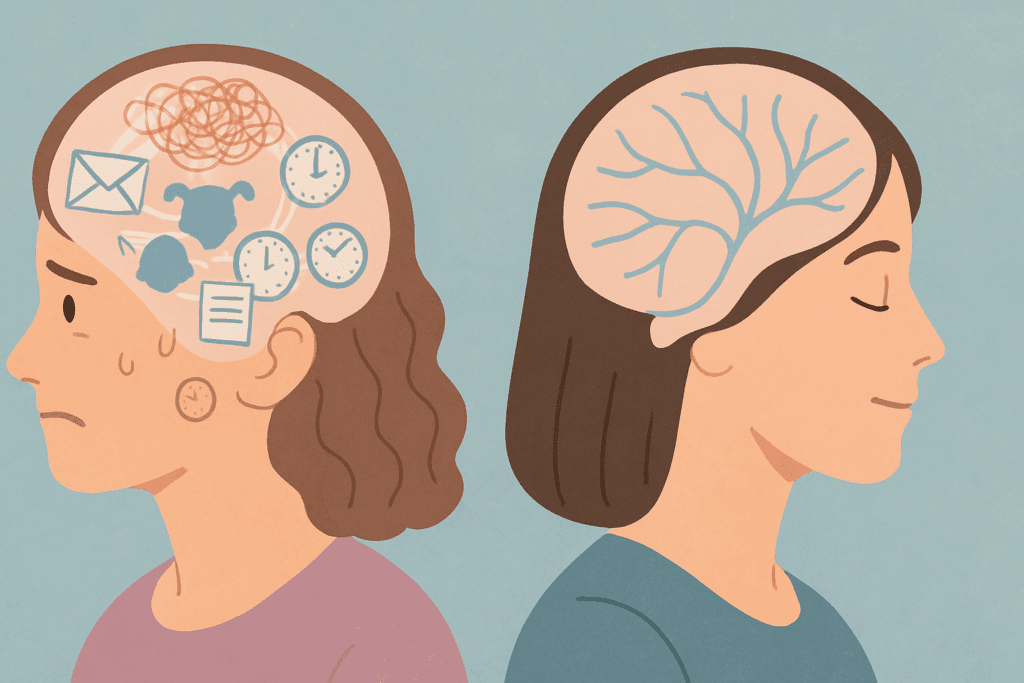
Why Herbs? The Scientific and Traditional Appeal of Botanical Nootropics
Herbs known for their nootropic qualities often possess adaptogenic or nervine properties, which means they help the body adapt to stress and support the nervous system. For women with ADHD, the appeal lies in their dual action: calming the mind while promoting alertness and focus. These herbs are not quick fixes but long-term allies that work subtly, complementing brain exercises to improve memory and concentration over time.
Scientific validation is increasingly supporting what traditional healers have long known. Many of these herbs have been the subject of rigorous studies exploring their effects on neurotransmitter modulation, brain circulation, and synaptic plasticity. When combined with memory methods for studying or brain gym activities for adults, herbs can serve as catalysts for sharper cognitive performance.
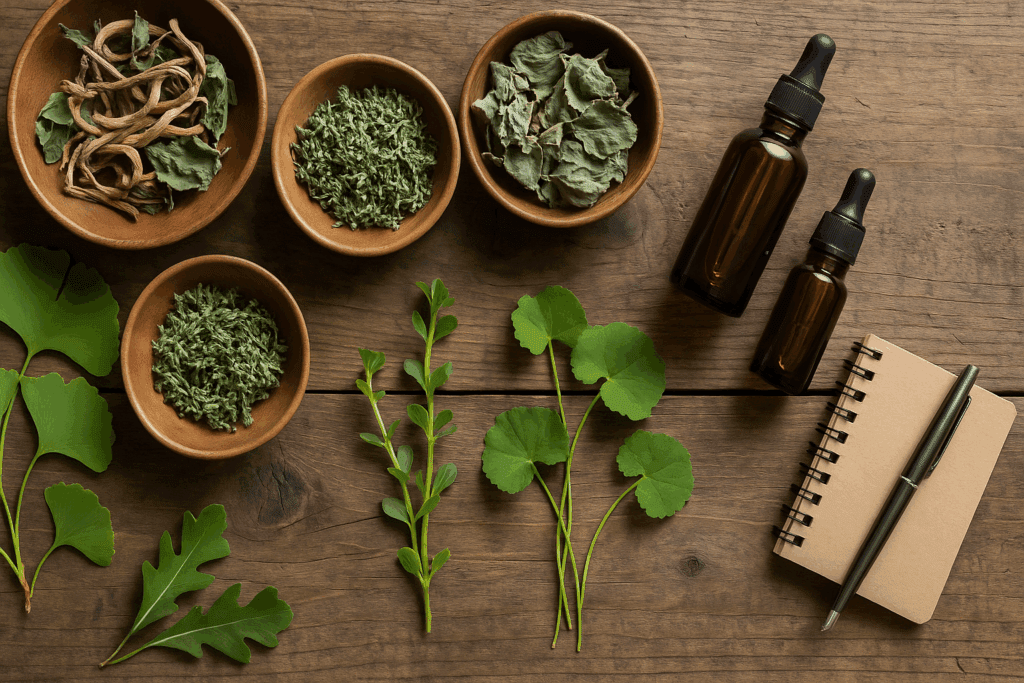
Top Herbs for ADHD in Women: Nature’s Gentle Cognitive Enhancers
One of the most extensively researched herbs for cognitive support is Ginkgo biloba, known for its ability to enhance blood flow to the brain and improve memory recall. Its antioxidant compounds help protect neurons from oxidative stress, making it ideal for women seeking memory boosting exercises or wondering how to remember what you read for exams. Ginkgo may also assist with regulating dopamine levels, a neurotransmitter closely linked to ADHD symptomatology.
Another powerhouse is Bacopa monnieri, an Ayurvedic herb praised for enhancing memory and reducing mental fatigue. Bacopa influences cholinergic function, which plays a critical role in learning and attention. When combined with memory methods techniques or exercises to improve memory, Bacopa may amplify the brain’s ability to encode and retrieve information efficiently.
Rhodiola rosea, a Siberian adaptogen, is valued for its capacity to enhance resilience under stress and improve mental stamina. This can be particularly beneficial for women managing ADHD-related executive dysfunction. By incorporating Rhodiola alongside brain training activities or memory workout routines, women may experience greater consistency in mental performance.
Gotu kola, another traditional remedy, has been shown to enhance cognitive clarity, reduce anxiety, and improve circulation. It offers a calming effect without sedation, supporting women who need to sharpen their brain without feeling overstimulated. For those practicing cognitive training activities or brain games to help memory, Gotu kola can subtly support their efforts.
Lastly, Panax ginseng, a well-known adaptogen, may enhance working memory and mental clarity, particularly when paired with free brain improvement exercises or brain boosting games. Its ginsenosides appear to influence neurotransmission and neuroprotection, making it a useful ally for sustained attention.
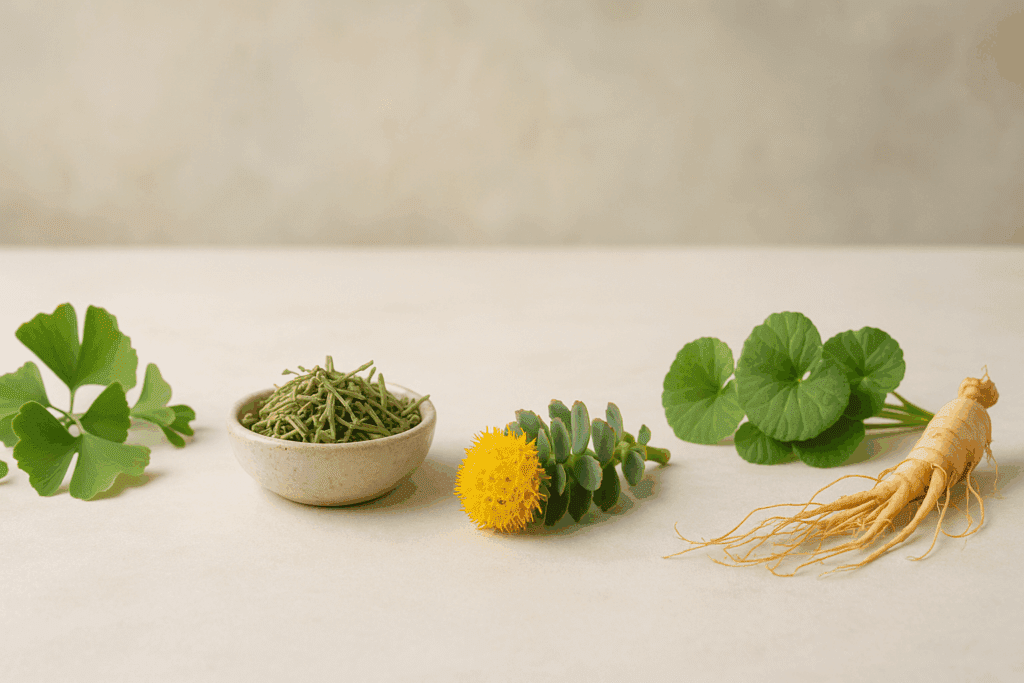
Integrating Herbs with Lifestyle and Cognitive Strategies
Herbal remedies are most effective when integrated into a broader lifestyle plan that includes brain exercises to increase memory and other structured mental routines. Pairing these herbs with evidence-based memorization tips for studying or engaging memory methods for studying helps reinforce neural pathways and improve retention.
For example, using Ginkgo biloba in tandem with study skills memorization techniques can help reinforce short-term memory, while Bacopa monnieri can support the deeper processing required for long-term retention. Women looking for how to memorize things fast for a test or how to remember information for a test often find that coupling herbs with structured review techniques yields better results.
Daily routines might include 5 minutes of focused breathing, followed by brain gym activities for adults such as mental arithmetic, creative writing, or strategic games. These can serve as effective warm-ups for deeper cognitive tasks. Incorporating herbal teas, tinctures, or capsules during these rituals can enhance their neurocognitive benefits and provide long-lasting mental clarity.
The Importance of Personalization and Professional Guidance
It is essential to recognize that each woman’s neurochemistry is unique, especially when dealing with ADHD. Herbs that work well for one individual may not be suitable for another, and dosages can vary based on metabolism, lifestyle, and other health conditions. Professional guidance from an integrative physician, herbalist, or naturopath can help tailor herbal regimens to each woman’s cognitive goals and physical constitution.
Moreover, combining herbs with elderly memory enhancement exercises or brain training programs allows for a dynamic and personalized approach. Women exploring how to stay mentally sharp into your 80s and beyond may benefit from combining herbal protocols with long-term cognitive strategies. These plans can be adjusted periodically to reflect changes in lifestyle, hormonal shifts, or evolving cognitive goals.
By monitoring cognitive outcomes using simple tools like journaling or digital brain games to improve memory, women can gain insights into what works best for their individual needs. This self-awareness is a vital part of a holistic approach to managing ADHD with natural remedies.
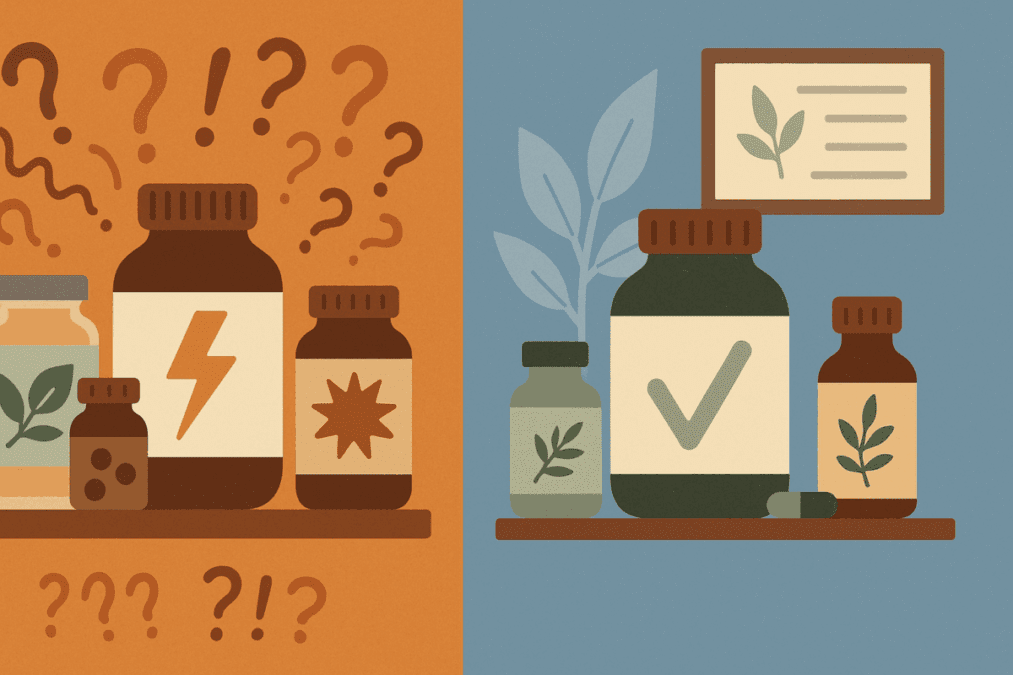
Navigating Common Myths About Natural Remedies for ADHD
Despite growing evidence, many misconceptions persist regarding the effectiveness of herbs for ADHD. Some dismiss them as placebo or too weak to make a difference. However, clinical and ethnobotanical literature reveals a more nuanced picture. For example, a meta-analysis of Bacopa monnieri has shown statistically significant improvements in attention and processing speed.
Others worry that natural equals unregulated, assuming herbs lack scientific rigor. In reality, many herbal supplements undergo quality testing and are backed by centuries of therapeutic use. Still, it’s vital to choose high-quality, standardized products from reputable brands and to understand how to memorize things fast for exam success without relying solely on any single solution.
Importantly, natural remedies should not be viewed as isolated treatments but as part of a systems-based approach to mental health. The best exercise for increasing memory power often involves a combination of herbal, behavioral, and psychological practices that work synergistically. This perspective helps dispel the myth that herbs must replace conventional therapy rather than complement it.
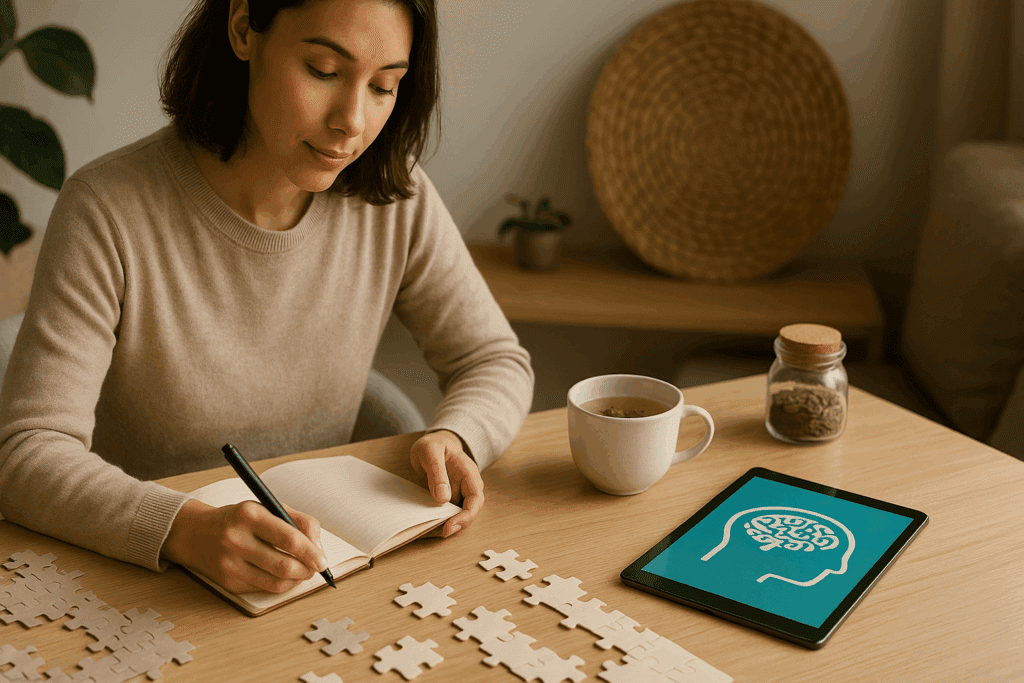
Frequently Asked Questions: Natural Herbs and Brain Training for Women with ADHD
What are some overlooked herbs that may support ADHD symptoms in women, and how do they work?
While popular herbs like Ginkgo biloba and Bacopa monnieri are widely recognized, lesser-known botanicals such as Lion’s Mane mushroom and Lemon Balm are gaining attention for their cognitive benefits. Lion’s Mane supports neurogenesis, which can be enhanced through brain training programs that stimulate new neural connections. Lemon Balm, on the other hand, offers calming effects that may help balance the overstimulation often experienced in ADHD. When paired with exercises to strengthen memory, these herbs can create a holistic pathway to improved focus and emotional regulation. Integrating these into daily routines alongside brain games to increase memory can encourage long-term neurological adaptation.
How can brain gym activities for adults be adapted specifically for women with ADHD?
Brain gym activities for adults can be tailored for women by aligning them with the hormonal and emotional fluctuations they often experience. For instance, pairing memory boosting exercises with rhythmic movements or guided breathing can engage both hemispheres of the brain more effectively. These routines can also serve as transitions between tasks, helping to reset attention. Women who integrate 3 brain exercises to boost memory into their morning rituals often report improved cognitive fluidity and a greater ability to multitask effectively. The emotional regulation benefits of these brain exercises to improve memory and concentration should not be underestimated, especially in stressful environments.
Is there a connection between memory workout routines and improved emotional regulation in ADHD?
Absolutely. Engaging in memory workout routines not only strengthens recall but also helps regulate mood and impulsivity. For women with ADHD, emotional dysregulation is a common challenge, and structured cognitive training activities provide a non-invasive way to restore balance. Brain games to improve memory—especially those that challenge working memory—also reinforce prefrontal cortex function, which governs emotional responses. When performed regularly, these memory exercises can reduce emotional volatility and improve day-to-day decision-making. Over time, they become essential tools for self-management alongside natural herbal interventions.
How can women with ADHD use brain training to improve their professional performance?
Women navigating the workplace with ADHD often benefit from targeted brain training programs that emphasize executive function skills. These might include planning, task-switching, and time management, which can be bolstered through brain exercises to increase memory. Regular use of memory boosting exercises like pattern recognition tasks or strategic card games builds cognitive endurance. When paired with the best exercise for increasing memory power, such as cross-lateral coordination drills, mental clarity and productivity are significantly enhanced. Long-term, such practices can transform how women manage workloads and respond to cognitive fatigue.
What role do elderly memory enhancement exercises play in the long-term cognitive health of women with ADHD?
Elderly memory enhancement exercises may seem geared toward aging populations, but they offer powerful preventive benefits for women with ADHD as well. These exercises emphasize neuroplasticity and are often designed to be low-stress, making them ideal for sustained practice. When incorporated with brain games to help memory, they offer long-term reinforcement of skills learned through other cognitive training activities. The beauty of these exercises lies in their simplicity and accessibility, enabling women of all ages to protect their memory and mental agility. As women seek ways to stay mentally active into later decades, such tools become invaluable.
How can herbal remedies be combined with cognitive strategies for maximum impact?
The synergy between natural herbs and structured mental exercises creates a powerful framework for managing ADHD. For example, combining Rhodiola rosea with free brain improvement exercises such as abstract reasoning puzzles can improve both mood stability and mental resilience. The key is consistency—using herbal tinctures or capsules at regular times while engaging in brain boosting games that demand adaptive thinking. Pairing herbs with exercises to improve memory also allows neurotransmitter pathways to remain active and plastic. Over time, this integrated approach results in improved mental flexibility and sharper attention spans.
Can brain games to increase memory be used effectively during hormonal changes like perimenopause?
Yes, brain games to increase memory can be incredibly effective for women experiencing hormonal transitions such as perimenopause. These periods are marked by cognitive disruptions, and engaging in brain training programs can help buffer those changes. When combined with exercises to strengthen memory and gentle adaptogenic herbs, these practices support both emotional balance and mental sharpness. Timing is important—doing brain exercises to improve memory and concentration during peak energy times of day may yield better results. Women who proactively incorporate these methods often find that they maintain focus and memory even amid significant hormonal fluctuations.
What are some practical ways to implement cognitive training activities into a busy lifestyle?
For women juggling work, family, and personal development, embedding cognitive training activities into existing routines is key. Morning rituals might include 5-minute memory exercises or a quick brain boosting game before starting the day. Commuting can be transformed into training time through memory games or strategic problem-solving apps. Scheduling weekly brain gym activities for adults like puzzle-solving sessions or verbal memory drills can help establish consistency. The important thing is to treat these memory workouts as essential self-care, just like nutrition or sleep hygiene.
Are there any brain exercises that specifically support verbal memory in ADHD?
Yes, there are targeted brain exercises to improve memory and concentration that can significantly support verbal recall. These include repeating short speeches, learning new vocabulary daily, or storytelling activities that engage long-term and working memory. When paired with herbs that support cholinergic activity, such as Bacopa, these exercises can yield noticeable gains. Brain games to help memory such as word association puzzles or rapid naming tasks also build pathways crucial to fluent communication. Women with ADHD often find that consistent engagement with these tools improves both social fluency and academic or professional output.
How can women evaluate the effectiveness of their memory boosting exercises over time?
Tracking progress is essential to maximizing the benefits of memory boosting exercises. Keeping a journal to log daily brain training activities and noting changes in recall, attention, and mood can offer valuable insight. Some women use brain games to increase memory with built-in analytics to monitor performance trends over time. As improvements become apparent, increasing the complexity of cognitive tasks ensures continued brain stimulation. Eventually, the integration of memory exercises into daily life becomes second nature, leading to better focus, emotional balance, and mental resilience for women with ADHD.

Conclusion: Unlocking Cognitive Potential Through Nature and Nurture
For women with ADHD seeking focus, clarity, and improved memory, herbs offer a compelling, evidence-backed solution when used wisely. Their gentle yet effective properties make them ideal companions for brain exercises to improve memory and concentration, especially when personalized and supported by professional guidance.
Integrating these natural allies with brain training, memory boosting exercises, and memory methods techniques creates a holistic cognitive wellness strategy. From understanding how to remember stuff when studying to learning how to memorize for exams, the synergy of herbs and mental training lays a foundation for lifelong clarity.
As more women seek ways to keep their minds sharp as they age, herbal medicine offers not just hope, but a roadmap grounded in science, tradition, and self-awareness. Whether you are exploring the best herb for ADHD or simply want to discover brain gym activities for adults, the combination of expert-backed remedies and intentional mental practice may unlock a future of sharper thinking and resilient mental focus.
Further Reading:
22 brain exercises to improve memory, cognition, and creativity


